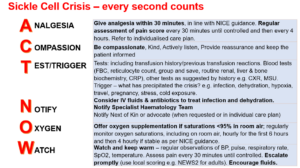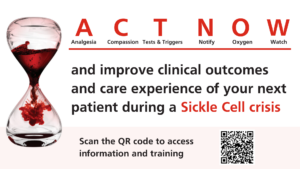ACT NOW Sickle Cell Acronym
ACT NOW Sickle Cell Acronym and treat a sickle cell crisis fast
The NHS is supporting better care for patients across England by encouraging clinicians to ACT NOW whenever a patient attends hospital in a sickle cell crisis. Codeveloped by clinicians, experts, people with sickle cell and their families, the ACT NOW approach supports a rapid and effective response to a sickle cell crisis in patients attending any hospital.
Materials supporting use of the ACT NOW approach, which was included in the Royal College of Emergency Medicine’s best practice guidance, are now available to all staff at all hospitals throughout England. Read on to learn more about ACT NOW and for access to training and education materials to support your clinical care for a sickle cell crisis.
Background to ACT NOW
Around 17,000 children and adults in England have sickle cell disorder, which is a serious inherited blood disorder which predominantly affects people of black African and black African Caribbean heritage. A gene mutation causes red blood cells to become irreversibly curved, or sickle shaped, which can lead to haemolytic anaemia, or a sickle cell crisis, when damaged red blood cells block vessels and restrict oxygen supply. This can lead to stroke, acute chest syndrome, sight loss, bone damage, priapism, organ damage and death People often endure severe pain and need hospital admission so they can be given effective pain relief and treatment to prevent organ failure that can be fatal.
The acronym was cocreated to help improve the care given to people in a sickle cell crisis, in response to the recommendations and challenges highlighted in the ‘No One’s Listening report‘. The report identified avoidable deaths and failures of care for sickle cell patients.
The NHS needed to address these challenges and NHS England – London region held a learning event in response. Participants from across the country representing clinicians, patients, carers and commissioners identified the need to develop an acronym to respond to the sickle cell patient in crisis.
Developed collaboratively with clinical experts and patients, the acronym supports a rapid and effective response to a sickle cell crisis. The acronym has been created for use in emergency departments, by-pass units, relevant acute wards and Ambulance Services. London Ambulance service is currently implementing ACT NOW in conjunction with the Digital Universal Care Plan for sickle cell patients. The aim of ACT NOW is to improve patient experience and clinical outcomes for adults and children experiencing a sickle cell crisis.
Focused evaluation
The acronym has been launched in 14 NHS sites in four regions across England since 21 May 2024. Five more sites including two prison sites are joining our evaluation group. These 19 sites are supporting formal evaluation of ACT NOW to ensure impact, effectiveness and highlight areas for future improvement. Evaluation includes staff surveys, audits and focus groups including staff and patient feedback. NHS London and the evaluation sites are working in collaboration with the Sickle Cell Society, Haemoglobinopathy Coordinating Centre (HCC) Networks and the NHS England Health Inequalities Team.
Key learning materials
To increase awareness of sickle cell and the confidence of clinical staff in treating patients in a sickle cell crisis ACT NOW links staff to e-learning education and training resources. The No One’s Listening Report identified lack of awareness and understanding across staff groups as a key concern to be addressed. See links to access learning materials below:
- Sickle Cell Disorder National Education Programme.
- Sickle cell disease: A tool for acute admissions from King’s Health Partners (KHP)
- The ACT NOW acronym is included in the Royal College of Emergency Medicine’s best practice guidance.
Links to external information and resources
Resources to support the rollout of the ACT NOW acronym including key messages, posters and social media assets can be found on NHS Futures. All EDs, by-pass units, relevant acute wards, ambulance services and networks are welcome to use the assets.
Additional resources are also available from the Sickle Cell Society to support the implementation of the acronym and how it will benefit patients in sickle cell crisis.


